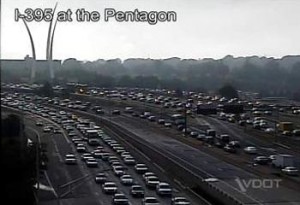 Department of Defense furloughs went into effect today and AAA Mid-Atlantic suggests that may mean less traffic congestion.
Department of Defense furloughs went into effect today and AAA Mid-Atlantic suggests that may mean less traffic congestion.
In Virginia alone, nearly 72,000 DoD employees are affected by furloughs, which require one unpaid day off per week for 11 weeks. The state is expected to be particularly hard hit by the cuts due to the Pentagon being housed in Arlington.
It’s too early to definitively claim furloughs will ease traffic congestion, but AAA believes fewer people on the road could lead to less gridlock and fewer accidents. In fact, the organization suggests commutes could resemble those of July and August, when the region experiences its lowest traffic volume and rate of accidents.
“For all other workers, the morning and evening commutes to the daily grind could look like it does on any of the ten federal holidays in the Washington metro area or on Fridays, when federal workers use their flex-time schedules or compressed work weeks (AWS) to take time off,” said John B. Townsend II, AAA Mid-Atlantic’s Manager of Public and Government Affairs.
AAA predicts Metrorail and Metrobus ridership may be affected as well. According to WMATA, nearly half of peak period commuters are federal employees and 35 Metrorail stations serve federal facilities, including the Pentagon in Arlington.
Rep. Jim Moran (D) took to Twitter earlier today to express his displeasure with the furloughs. He also sent the following statement to ARLnow.com:
“Due to sequestration, today marked the first of 11 furlough days for 650,000 DOD civilian employees. This 20 percent pay cut is the unfortunate and shameful result of Congress’ failure to work together to find an appropriate way to reduce the federal debt and deficit. I voted against the Budget Control Act that set up sequestration not only because it focused solely on cutting discretionary spending at the expense of increased revenues, but I feared that the Supercommittee could not find compromise. Congress must make tough choices, but we cannot balance the budget on the backs of our federal workers.”

